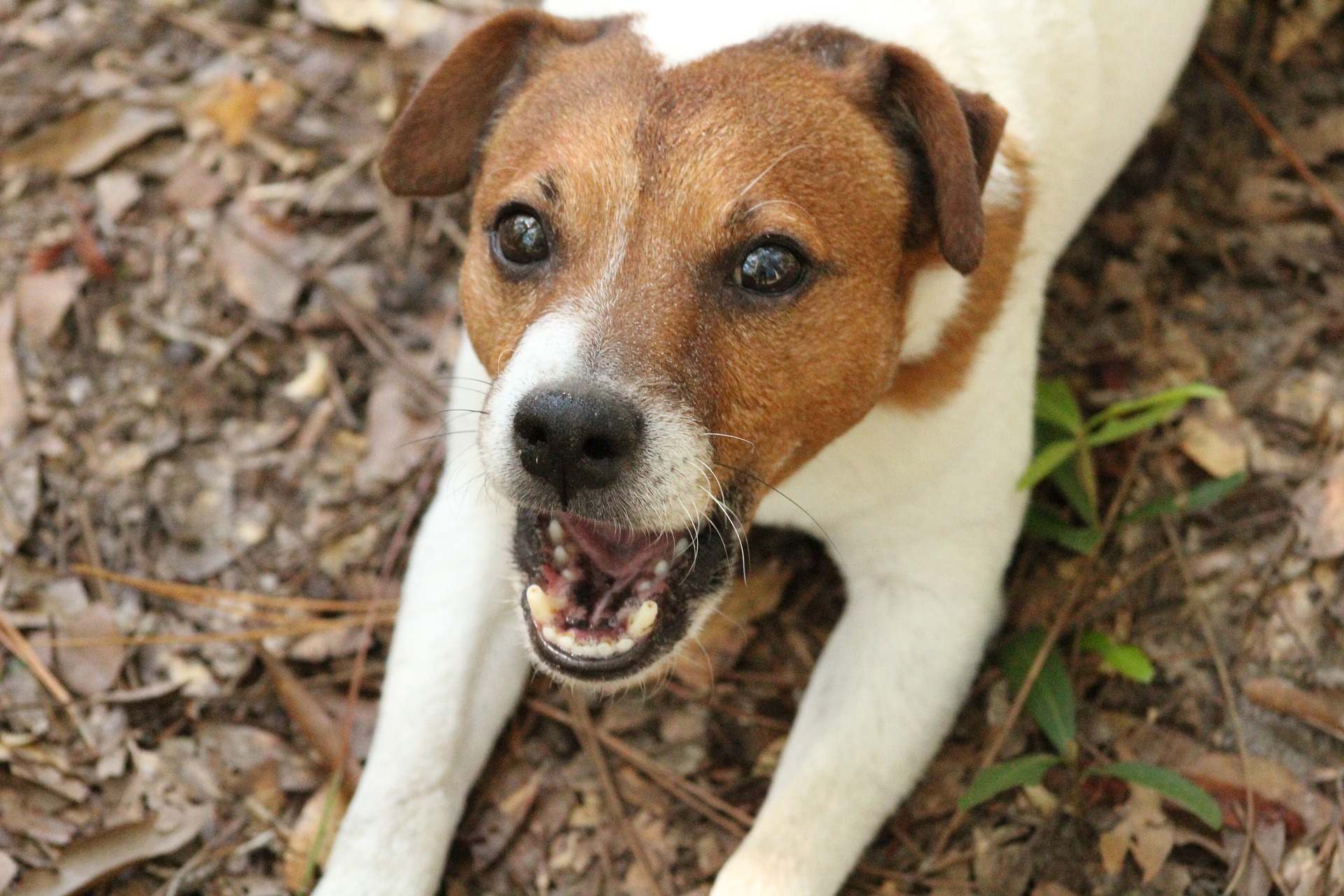If your dog barks at everything, then trust me, you’re not alone.
Dogs bark. That’s a fact. It’s a natural reaction that, in most cases, is nothing to worry about. But when the occasional bark turns into an all-day howl, you’ve got a problem. And so do your neighbors.
A dog that barks at everything and everyone is doing more than just exercising their vocal cords.
There’s a problem, a problem that’s likely to be turning every walk into a nightmare and every meeting with the neighbors into an exercise in damage control.
Sometimes, owners can make the problem worse by resorting to short term solutions like scolding, yelling, or inadvertently reinforcing bad behavior.
And it’s understandable. When a dog barks constantly, it’s easy to lose your cool. But reactionary discipline doesn’t work.
If you want to find a long-term solution to the problem, you’re going to have to find the source of your dog’s behavior.
Sometimes, the barking might be arising from boredom. Other times, it may stem from separation anxiety. In some dogs, it could be down to territorial instincts.
Basically, there’s any number of issues that can result in excessive barking. And finding which one is reasonable in your own case is key to figuring out the right approach.
Once you know what triggers the nuisance barking, you can take steps to manage your dog’s environment and teach them when and where to be quiet.
If you’re ready to put an end to the barking, it’s time to find the reason and take control.
(video will open in a new window)
Reasons for Excessive Barking
Barking can mean different things in different situations. Some of the most common explanations for excessive barking include:
Old-Age and Medical Conditions
As a dog ages, their cognitive functions can decline, leading to out-of-character behavior and increased barking.
Occasionally, increased barking can also be rooted in medical problems such as elevated blood pressure, deafness, blindness, pain, or even tumors.
Alert Barking
Some dogs will bark at anything that catches their attention.
Whether it’s the neighbors pulling into the driveway, the mailman at the door, a leaf floating past the window…
If it catches their eye and if they think it should catch yours too, they’re going to bark until they’re confident you’re in the know.
Some owners appreciate being alerted to every little thing. Others really don’t. If you live in an apartment block or in close proximity to your neighbors, this type of barking can get old fast.
Territorial Barking
Most dogs are territorial to a degree. But in some breeds, the instinct can be particularly intense.
If someone or something intrudes onto their patch without prior approval, a territorial dog isn’t going to like it.
How do they show their disapproval?
You guessed it…. bark.
In some way, territorial barking is similar to alert barking. But whereas alert barking will stop once you become aware of what’s happening, territorial barking will continue until the ‘intruder’ goes away, and the ‘threat’ disappears.
What makes territorial behavior particularly challenging to tackle is its self-reinforcing nature.
If a dog barks at a cat or a wandering dog in the yard. There’s a good chance that the intruder is going to run away. In your dog’s mind, that’s a result.
They wanted the cat/ dog to go away, they barked, and it went. Mission accomplished.
Once they learn barking works, they’re going to keep doing it.

Separation Anxiety
Excessive barking is one of the most common signs of separation anxiety in dogs.
Separation anxiety can affect any breed and occurs when a dog becomes distressed after being separated from their owner.
Although certain breeds like Labrador Retrievers, Border Collies, Cavalier King Charles Spaniels, Jack Russell Terriers, and German Shepherds are more prone to it than others.
Play and Excitement Barking
Dogs express themselves through barking. If they’re happy or excited during a game, it’s entirely natural and normal for them to bark.
Usually, play barking will be higher-pitched than other types of barking.
While a few playful barks are usually fine. You might want to consider managing the behavior if it becomes excessive enough to cause a problem for your neighbors or other dogs.
Fearful and Reactive Barking
If a dog encounters something that scares them, they’ll often bark. Although this type of barking can often be misread as aggressive, it’s actually part of the fear response.
It’s most common in dogs that have either been improbably socialized or who’ve experienced some kind of traumatic experience.
Reactive barking (i.e., when a dog overreacts to things in their environment by barking, lunging, or growling) is one of the most common types of barking.
It can occasionally be rooted in a fear response. But can also stem from the dog’s genetic make-up or from improper socialization.
Demand Barking
Dogs aren’t stupid.
You only need to respond to their barking a couple of times for them to quickly realize that barking gets them what they want – your attention.
Whether we respond by petting them, throwing a ball, or even just shouting at them to stop, we’re caving in to their demands and rewarding them with our attention. Job done.
Boredom Barking
Barking that’s repetitive and even in pitch and tone could indicate a bored dog.
If a dog is under-stimulated or left alone for long stretches of the day without adequate distractions. They’re going to make their feelings known somehow or other.
In some cases, the barking will be accompanied by bouts of destructive behavior.
Related Post: What To Do If Your Dog Barks At Strangers On Walks

What To Do If Your Dog Barks At Everything
Identifying the reason for excessive barking is the easy bit. Now comes the challenging part: stopping it.
Some solutions are simple enough. If the barking is due to boredom or under-stimulation, you don’t have to be a genius to work out how to fix it.
Other solutions are more complex, requiring plenty of patience, perseverance, and training before progress is made. But providing you’re willing to put in the work, no task is impossible.
Have a Check-Up
If your dog is old; if the excessive barking seems to have come out of the blue; or if you’ve noticed any other out-of-character behavior (an increase in aggression, changes in appetite, thirst, or sleep patterns, etc.), book a check-up with your vet.
Your vet will be able to rule out any underlying medical issue or provide advice on the best treatment options if a health issue is identified.
Try Calming Techniques
If a dog is fearful, hyperactive, jittery, or just too darn excited to do anything but bark. A few calming tricks can go a long way to restoring the peace.
Massage, soothing music, and even aromatherapy can help, as can calming exercises.
If you need some guidance to get started. I’d highly recommend checking out these 5 step-by-step calming exercises from the Online Dog Trainer.
By using them to teach your dog ‘doggy life skills’, you’ll help them stay calm, focused, and ‘in the zone’, regardless of what’s happening around them.

Remove Visual Triggers
If your dog alert barks, remove any visual triggers that could set off their behavior.
This could include keeping blinds or curtains closed, turning the radio or TV up to drown out any audio stimuli from outside, or restricting access to windows by re-arranging the furniture.
Desensitize
If your dog barks excessively, desensitizing and counter-conditioning can help.
The idea behind the process is to teach the dog to associate positive things with the sounds and sights that usually trigger barking.
Say they usually bark at people from the window. As soon as they notice the passerby, but before they start barking (this is crucial – if they’ve already started barking, it’s too late), say “yes” and reward them with a high-value treat.
If they look past the person without barking, say “yes” and reward them again.
Once they start to associate good things with keeping their eyes on you and their mouth shut, it’s only a matter of time before barking loses its appeal.
Up Their Exercise
If a dog doesn’t get enough physical stimulation, they’re going to get bored, unhappy, and very, very vocal.
Giving them access to the yard is great, but it’s no substitute for proper, structured walks.
Tire them out in the morning with a good, long walk and try to build as many other ways of keeping them active into the day as possible.
This might be a game of frisbee, a session of tug of war, dancing around the yard with a flirt pole, or even getting them involved in some agility training.
Stimulate their Minds
While physical exercise is crucial, don’t forget their brains need a work-out too.
Training, puzzles, and interactive toys are all great ways of keeping your dog’s mind happy and active.
When you leave the house, be sure to leave a few entertaining toys or even a stuffed Kong around to keep them busy.
Set Up a Safe Space
If your dog gets bored while you’re away, creating a safe space can go a long way to reducing bouts of destructive behavior and boredom barking.
If they’ve already been crate trained and enjoy spending time in their crate, you could try using that.
If not, think about making a pooch-friendly playpen with plenty of toys, games, and blankets to keep them snug and entertained.
Related Post: Help! My Dog Barks When I Leave

Manage Play Barking
If play sessions are getting too noisy for comfort, finding a way to manage your dog’s excitement is crucial.
If a particular type of game tends to trigger the barking, jump in with an interruption and a new game before they get too carried away.
Once playtime is over, spend a few minutes running through these 5 step-by-step calming exercises to bring your dog’s excitement down a few notches.
You should notice a marked improvement in their levels of calm afterward.
Avoid Negative Reinforcement
If a dog is barking to get your attention, don’t give it to them.
You might think you’re responding with negative attention when you say ‘no’, but your dog couldn’t give a hoot.
All they know is that you’ve responded. Result!
Next time they bark because their water bowl is empty, wait until they’re stopped barking to refill it. If they bark to ask you to throw a ball, ignore them until they stop.
Once they learn that demand barking doesn’t work, they’ll lose the incentive to do it.
Consult an Animal Behaviorist
Barking arising from separation anxiety is a complex problem that can be hard to treat alone.
While there are certain things you can do to lessen the problem (desensitization and counterconditioning being examples). Don’t feel that you’re in this alone, or that there’s any shame in asking for help.
If you’re feeling overwhelmed or if your dog isn’t responding to your training efforts, speak to a veterinary behaviorist or certified applied animal behaviorist.
As well as guiding your dog towards new, acceptable behaviors, they may also be able to recommend medical treatment to help.
Summing Up
A dog that doesn’t know the meaning of quiet time can be frustrating… and not just for you.
No one wants to live next door to a noisy neighbor, even if that nosy neighbor does come with big brown eyes and a wagging behind.
Unless you want to risk the wrath of the neighborhood, finding a solution to your dog’s excessive barking is crucial.
Not all the solutions we’ve seen are going to be overnight cures.
Dealing with boredom barking can usually be treated simply enough (up the exercise, invest in some puzzle games, and make time for plenty of play). But in most cases, the fix is a process, not a magic bullet.
If you’re serious about teaching your dog not to bark, and if you’re willing to invest the time, patience, and energy it takes to do that. It’s by no means an impossible task.
Stick with it. You’ll be happier, your neighbors will be happier, and, just as importantly, so will your dog.

